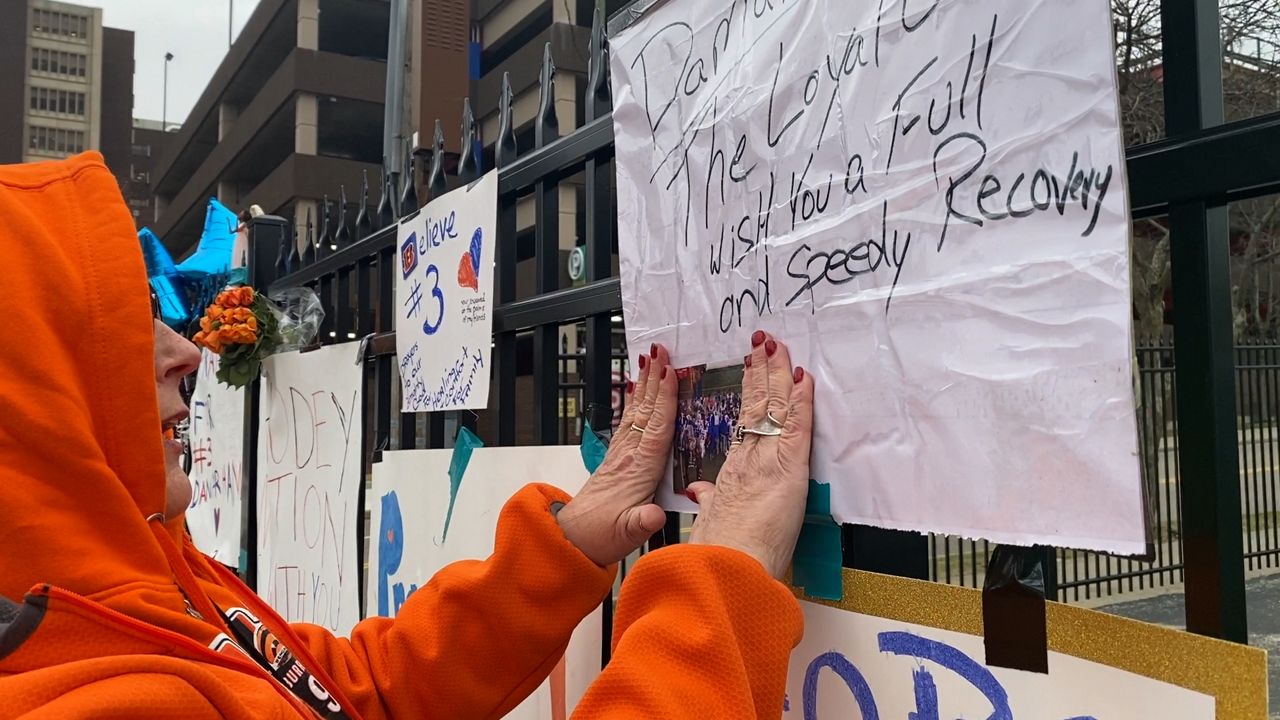Rep. Kevin McCarthy made significant strides Friday in his bid to become House speaker but continued to fall short in the 12th and 13th rounds of voting.
The House adjourned shortly thereafter, with members voting to reconvene at 10:00 PM Eastern.
What You Need To Know
- Rep. Kevin McCarthy made significant strides Friday in his bid to become House speaker but continued to fall short in the 12th and 13th rounds of voting
- After the contours of a deal supporting the California Republican began to come into focus, 14 members who had previously voted against McCarthy supported him in votes Friday
- Six Republicans remained steadfast in their opposition in the latest vote, setting the stage for a 14th round
After the contours of a deal supporting the California Republican began to come into focus, 13 members who had previously voted against McCarthy supported him in the 12th round, the first held Friday.
Rep. Victoria Spartz, R-Ill., also voted for McCarthy, as she did in the first three rounds before voting present every time Wednesday and Thursday.
And McCarthy flipped an additional vote from Rep. Andy Harris of Maryland in the 13th round.
Each time a Republican switched their vote to McCarthy, fellow members of the GOP erupted in applause.
But in the narrowly divided House, he could only afford four holdouts if everyone voted. Six Republicans remained steadfast in their opposition in the latest vote, setting the stage for a 14th round.
In the day’s first ballot, McCarthy finished with 213 votes, Democratic leader Hakeem Jeffries of New York received 211, Rep. Jim Jordan, R-Ohio, had four, and Rep. Kevin Hern, R-Okla., had three. It was the first time in the 12 rounds McCarthy received the most votes.
In the following round, McCarthy had 214 votes, Jeffries 212 and Jordan six.
Republicans Ken Buck and Wesley Hunt did not appear to be present Friday, lowering the threshold for a winner from 218 to 217 if no one casts a vote of “present.”
Rep. Mike Garcia, R-Calif., nominated McCarthy in the 12th round, while Rep. James Comer, R-Ky., put McCarthy’s name forward in the 13th vote.
“In a Republican majority under Speaker Kevin McCarthy, the forgotten working men and women’s voices will finally be heard and represented,” Comer said. “And in a Republican majority under Speaker Kevin McCarthy, this broken Congress will finally be fixed and we will return to regular order.”
But McCarthy’s chances of securing the votes needed immediately appeared bleak in the day’s first vote when Republicans Matt Gaetz of Florida and Lauren Boebert of Colorado each nominated other Republicans. Gaetz nominated Jordan, while Boebert endorsed Hern.
“[Garcia] said that Mr. McCarthy has earned the position,” Gaetz said. “You only earn the position of speaker of the House if you can get the votes. Mr. McCarthy doesn’t have the votes today, he will not have the votes tomorrow, and he will not have the votes next week, next month, next year.
“There is great trust in Mr. Jordan, and that’s why I am nominating him. And there is insufficient trust in Kevin McCarthy,” added Gaetz, who called negotiations with McCarthy “impure.”
Boebert, meanwhile, said she believes Hern “can unite this Republican conference and put forward the agenda that we all promised to work hard on and serve our American people to the best of our abilities.” She switched her to vote to Jordan in the following round.
For the first time in the voting, the Republican holdouts did not nominate an alternative candidate in the 13th round, but they continued to cast votes against McCarthy.
Before Friday’s session, McCarthy made no promises of a final vote that would secure him the speaker’s gavel, but glimmers were emerging of a deal with at least some of the far-right holdouts.
The California representative flipped more than a dozen votes in Friday’s first roll call, including Reps. Andy Biggs of Arizona, Dan Bishop of North Carolina, Byron Donalds of Florida, Ralph Norman of South Carolina, Scott Perry of Pennsylvania and Chip Roy of Texas. Biggs and Norman had previously considered themselves to be “hard nos” on McCarthy. Perry is the chairman of the Donald Trump-aligned Freedom Caucus and was highly critical of McCarthy on Thursday following negotiations. And Donalds’ name was put forward by Republicans several times Wednesday and Thursday as an alternative to McCarthy.
“We’re at a turning point,” Perry tweeted Friday. “I’ve negotiated in good faith, with one purpose: to restore the People’s House back to its rightful owners. The framework for an agreement is in place, so in a good-faith effort, I voted to restore the People’s House by voting for @gopleader McCarthy.
Bishop said an agreement reached with McCarthy reforms rules and procedures, commits to specific policy strategies and improves “the distribution of conservative voices across key committees.”
“These achievements will help to make the People’s House truly work for the American people again,” Bishop said. “We will hold Mr. McCarthy accountable to his promises.”
The Democrats again nominated their new House leader, Rep. Hakeem Jeffries of New York. Jeffries has received all 212 Democratic votes in each of the first 11 rounds.
“We Democrats offer the people of America through this unique body a good man who has the best interest of the American people at heart and is committed to preserving the fundamental principles that make this country great,” Rep. Jim Clyburn, D-S.C., said in nominating Jeffries.
The political spectacle unseen since the 19th Century has left Republicans in disarray and exposed anew the fragility of American democracy.
This time, Republicans are trying to elect their new House speaker against the backdrop of the second anniversary of the Jan. 6, 2021, assault on the Capitol. The deadly attack was an unimaginable scene of chaos that shook the country when a mob of then-President Donald Trump’s supporters tried to stop Congress from certifying the Republican’s 2020 election defeat.
“We’ve got some progress going on,” McCarthy said late Thursday, brushing back questions about the lengthy, messy process. “It’s not how you start; it’s how you finish.”
The agreement McCarthy presented to the holdouts from the conservative Freedom Caucus and others centers around rules changes they have been seeking for months. Those changes would shrink the power of the speaker’s office and give rank-and-file lawmakers more influence in drafting and passing legislation.
Even if McCarthy is able to secure the votes he needs, he will emerge as a weakened speaker, having given away some powers and leaving him constantly under threat of being voted out by his detractors. But he would also be potentially emboldened as a survivor of one of the more brutal fights for the gavel in U.S. history.
At the core of the emerging deal is the reinstatement of a House rule that would allow a single lawmaker to make a motion to “vacate the chair,” essentially calling a vote to oust the speaker. McCarthy had resisted allowing it, because it had been held over the head of past Republican Speaker John Boehner, chasing him to early retirement.
Other wins for the holdouts include provisions in the proposed deal to expand the number of seats available on the House Rules Committee, to mandate 72 hours for bills to be posted before votes and to promise to try for a constitutional amendment that would impose federal limits on the number of terms a person could serve in the House and Senate.
Without a speaker, the House cannot fully function. Members have not been sworn in and almost no other business can happen. A memo sent out by the House’s chief administrative officer Thursday evening said that committees “shall only carry-out core Constitutional responsibilities.” Payroll cannot be processed if the House isn’t functioning by Jan. 13.
Pressure has grown with each passing day for McCarthy to somehow find the votes he needs or step aside. The incoming Republican chairmen of the House’s Foreign Affairs, Armed Services and Intelligence committees all said national security was at risk.
“The Biden administration is going unchecked and there is no oversight of the White House,” Republicans Michael McCaul, Mike Rogers and Mike Turner wrote in a joint statement.
The disorganized start to the new Congress pointed to difficulties ahead with Republicans now in control of the House, much the way that some past Republican speakers, including Boehner, had trouble leading a rebellious right flank. The result: government shutdowns, standoffs and Boehner’s early retirement.
The longest fight for the gavel started in late 1855 and dragged on for two months, with 133 ballots, during debates over slavery in the run-up to the Civil War. This year’s vote is the fifth longest in history.




